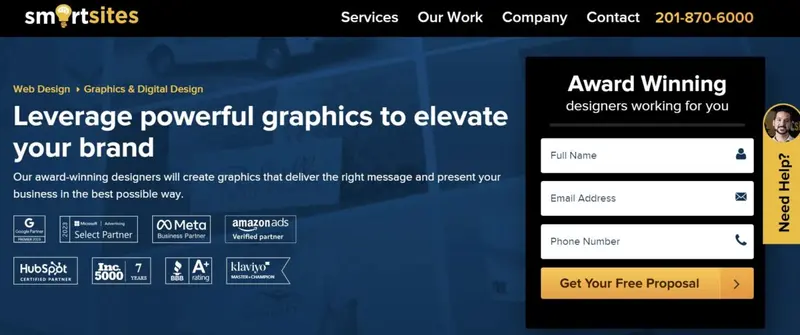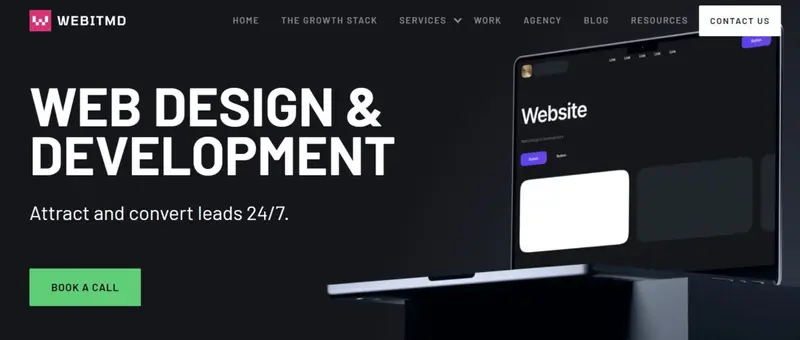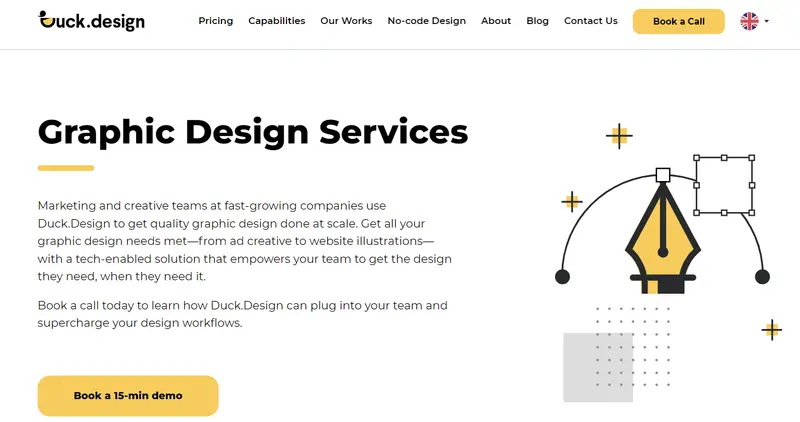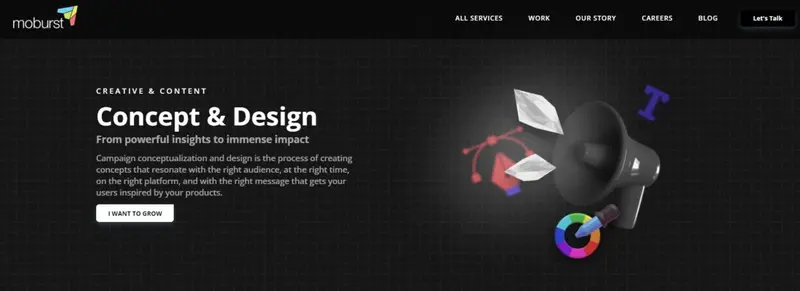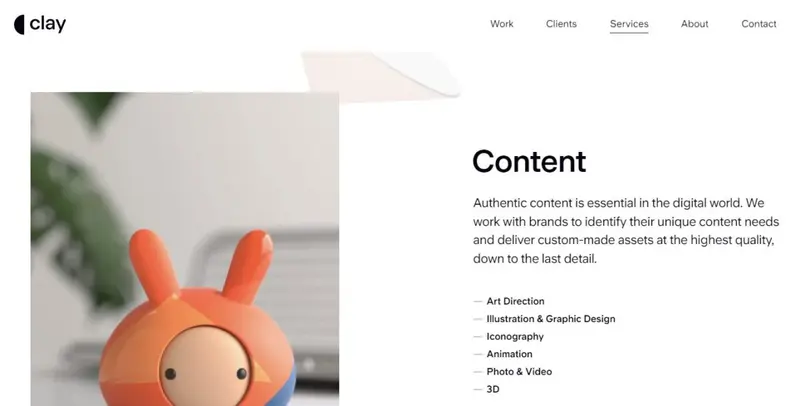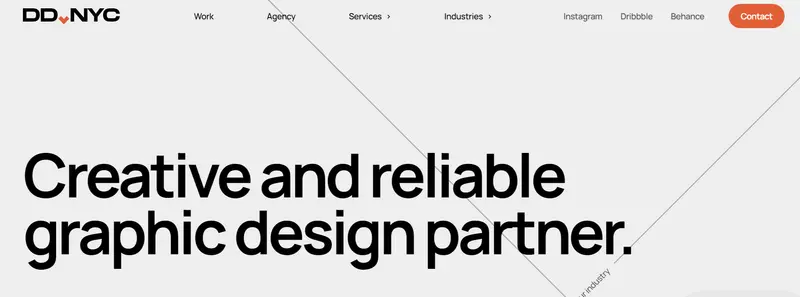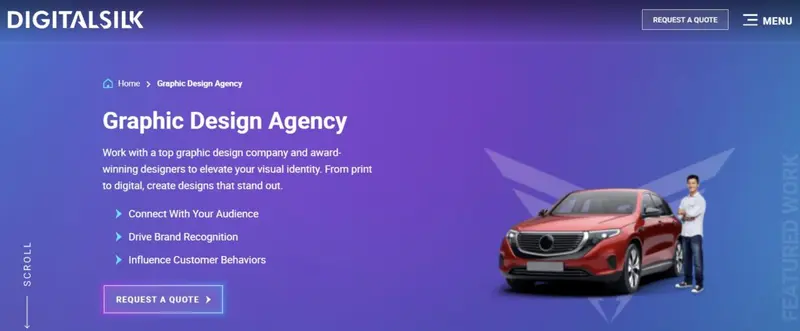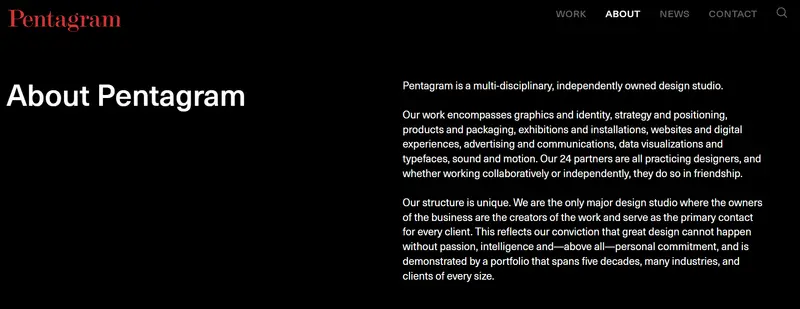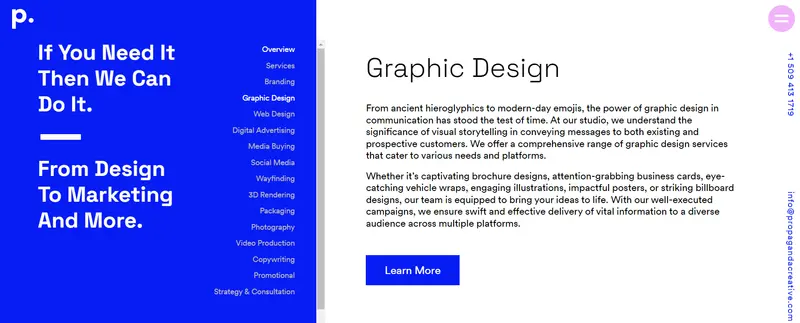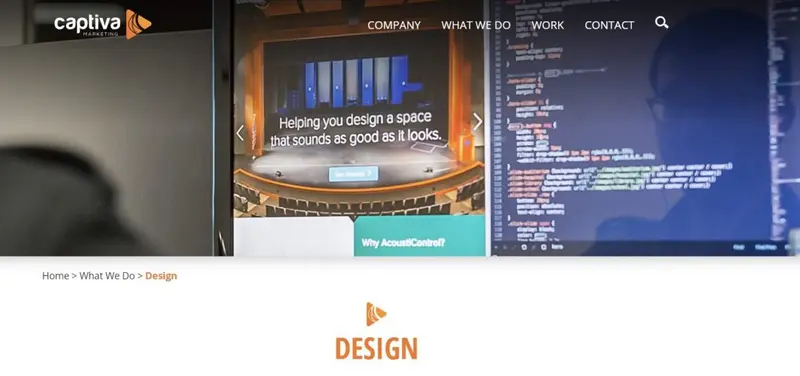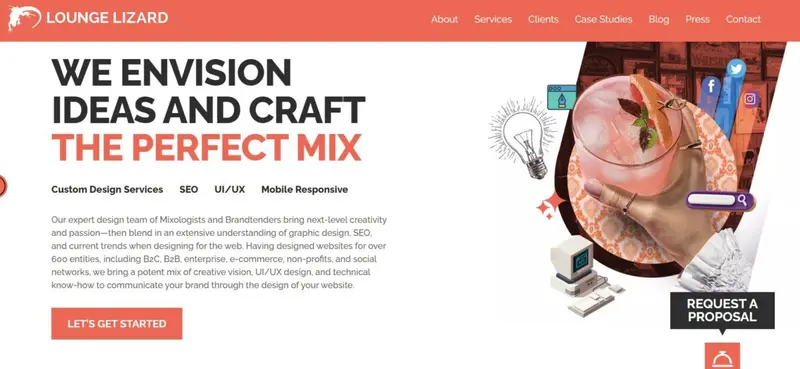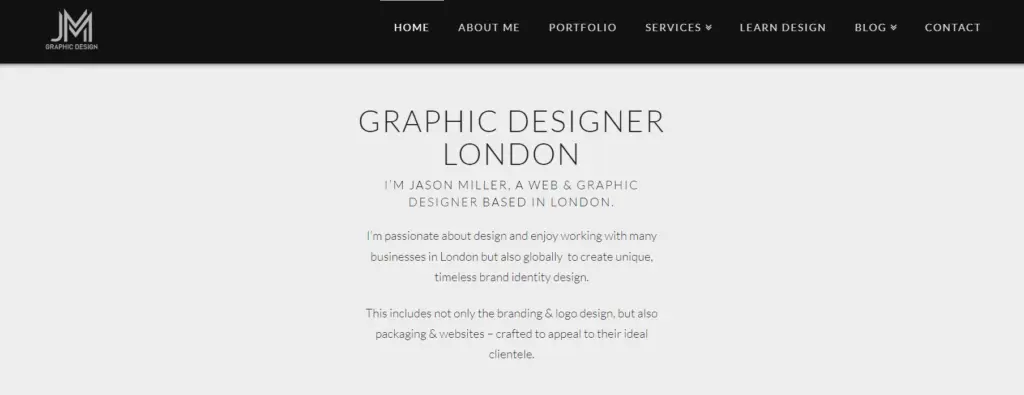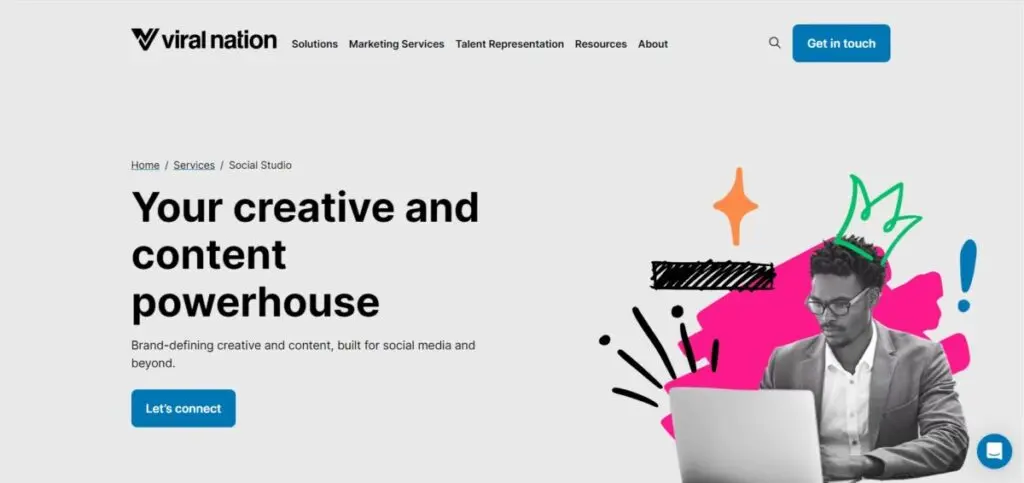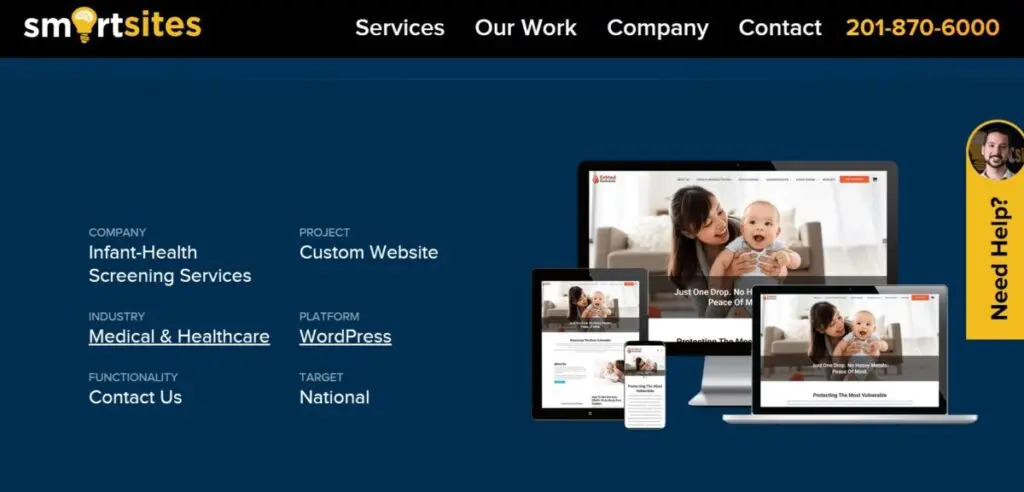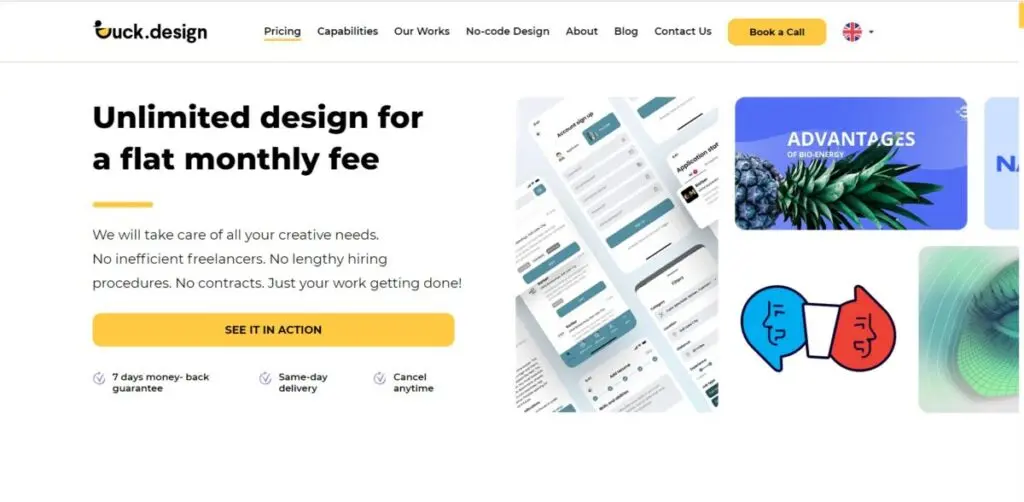In today's digital era, graphic design is essential for businesses of all sizes. Once focused on brand identities and print advertising, design agencies now offer modern graphic design to meet contemporary needs. Visual impressions are crucial in decision-making, as most information sent to the brain is visual. Capitalize on this power by integrating professional graphic design into your brand.
Effective graphic design goes beyond logos, impacting every aspect of your business. It builds trust, creating a memorable visual that instantly connects customers to your brand. This connection drives both purchases and brand loyalty. Don't underestimate the reach of well-executed graphic design; it's a potent tool that can elevate your business in today's competitive market.
Top 12 Graphic Design Service Providers
Location: Paramus, New Jersey Key Services: Print and Branding Design, Graphics and Digital Design Notable Clients: BMW, Microsoft, TikTok, Harvard University, Rakuten, Poker Stars, Porsche SmartSites offers comprehensive web design services. The company’s award-winning designers craft graphics that effectively convey your message and showcase your business. Their digital design specialists create attention-grabbing visuals to enhance customer engagement. SmartSites’ design services cover video production, web banners, email, infographic and mobile app design, and corporate photography. Additionally, SmartSites provides brand identity guidelines, logos, packaging and brochure design, business cards, and stationery. These services empower your business to harness the impact of meaningful design, elevating your online and offline presence. Location: Los Angeles, Miami, London, Sydney Key Services: Branding and Logos, Marketing Materials, Sales Collateral Notable Clients: CSU Stanislaus, Hyatt, Foresight Works, LanguageBird, VETTX, Legion Food Trucks WEBITMD, a global digital growth agency, has driven revenue for organizations worldwide for 15 years. Their expertise lies in increasing lead volume, enhancing brand awareness, and optimizing eCommerce checkouts. Their award-winning WEBITMD® Growth Stack provides a comprehensive marketing and tech team in one engagement. This stack incorporates the latest marketing tactics, sales technology, and operations automation to ensure measurable business growth. WEBITMD’s services cover branding elements like logos, colors, fonts, iconography, and brand guidelines for consistency. Additionally, they design various marketing materials, including email templates, eBooks, whitepapers, and infographics. WEBITMD aims to enhance every touchpoint with a great design that contributes to overall business success. Location: London, New York, Berlin, Hong Kong, Vilnius Key Services: Graphic Design, Motion Graphics, Brand Identity Design, SaaS Product Design, WebDesign, Software Design, Amazon Design, Print Merchandise and Packaging Design Notable Clients: Payfaction, Farsight, ChainTalk, Eco Essentials, Nordic Breathe, SwiDOC, Treasure Net At Duck.Design, there are no limits to your design needs. Whether it’s an extraordinary illustration, stunning print designs, or compelling digital marketing assets, their global community of top-notch graphic designers can bring your vision to life. Unlike traditional agencies, Duck.Design is a fully-equipped design solution tailored to the dynamic demands of enterprise teams. Duck.Design’s designers collaborate seamlessly across time zones, providing an always-on graphic design solution that can fulfill requests in as little as 12 to 24 hours. They curate a team of top designers worldwide, ensuring consistent and high-quality work. The platform has earned the trust of over 400 high-growth and enterprise companies, delivering rapid, top-quality graphic design work within a transparent subscription framework. Location: New York City, San Francisco, Miami, London, Tel Aviv Key Services: Concept Design, Social Media Design Graphics Notable Clients: Google, Pfizer, Uber, Nielsen, Samsung, Sony, Discovery, Reddit, Fiverr, iFOREX, Dunkin’ Moburst, a mobile-centric marketing agency, propels companies to scale and dominate their industry categories. The company excels in conceptualizing and designing campaigns. Their services include graphic design, with a diverse team creating visuals for websites and various social media channels. Within its web design and development services, Moburst crafts user-friendly websites with unique graphics that align with your brand and fulfill business objectives. Additionally, they assist in establishing a distinctive brand identity encompassing logo design, typography, color schemes, and more. Location: San Francisco, California Key Services: Web Design, UX/UI Design, Motion Design, 2D/3D Design, Graphic Systems, Brand Identity Notable Clients: Snapchat, Slack, Google, Meta, Credit Karma, Amazon, Stripe, Cisco, UPS, Coca-Cola Clay is a UI/UX design and branding agency that offers services to businesses of all sizes and industries for successful product and brand development. With a team of design and graphic specialists, Clay excels in crafting digital brand identities and providing strategic guidance for consistency. Their focus spans creating memorable designs for enterprise and consumer products and offering comprehensive systems for seamless product iteration. Clay’s portfolio showcases award-winning websites with exceptional graphics aimed at delivering the optimal user experience while achieving business objectives. The agency excels in world-class digital products, web design, and branding across various platforms. Clay also specializes in developing enterprise software that prioritizes user needs and provides a seamless and enjoyable experience like that of top consumer applications. Location: New York City, New York Key Services: Digital Design, Web Design, Packaging, Branding Notable Clients: Forbes, Walmart, Roommate, The Arts Building NYC, Ms. Foundation, Symphony Sleep DD.NYC is your fast and dependable graphic design partner, specializing in producing high-quality, on-brand, and budget-friendly materials. It’s the team you turn to when tangible results matter. Their services ensure that you get a seamless brand identity that effectively promotes your business. Their graphic design services cover a range of essentials. These include: Location: San Francisco, New York, Boston, Los Angeles Key Services: UX/UI Design, Design Systems, Digital Strategy, Branding, Logo Design Notable Clients: LinkedIn, Ford Models, Vivint, Rutter, Paycom, QuinStreet, HackBright Academy, GetHired.com Neuron, a leading UX/UI design agency, specializes in crafting digital experiences tailored for B2B workplace products. Recognized as a top UX design agency in 2023, Neuron’s industry expertise spans animation, computer software, and graphic design. Neuron specializes in user experience design, digital strategy, and front-end development. Their human-centered design approach helps identify customer pain points, enhancing their experience with your brand or product. Location: New York City, New York Key Services: Brand Design, Marketing Collateral Design, Tradeshow Design, Packaging Design, Creative Graphic Design Notable Clients: IBM, Northwestern University, XEROX, Microsoft, Sony, AT&T Digital Silk, a leading web design agency, offers custom websites, branding, and digital marketing solutions. From logo and brand book design to branded merchandise, digital brochures, and custom-designed websites on industry-leading platforms, Digital Silk’s award-winning designers craft standout designs to elevate your visual identity. Location: New York, London, San Francisco, Berlin, Austin Key Services: Brand Identity, Data Visualization, Digital Design, Editorial Design, Film and Motion Graphics, Packaging, Environmental Graphics Notable Clients: NYU, Rolling Stone, Harrods, Samsung, Upworthy, Rolls-Royce, Starbucks, United Airlines, Saks Fifth Avenue, Warner Brothers The name Pentagram inevitably comes up when discussing graphic design and iconic designers. This design studio is home to 25 graphic designers and art directors, collectively owning itself as the “world’s largest independently owned design consultancy.” Pentagram has an impressive client roster and a strong focus on building well-known brand identities. Importantly, all 25 designers actively practice their craft. Through either collaboration or independent working, they’re fully capable of delivering impactful designs. Location: Wall Street, Washington Key Services: Branding, Graphic Design, Web Design, Packaging, Copywriting, Video Production, Photography Notable Clients: Canopy Credit Union, High Caliber Whiskey, Leftover Toys, Peak Health, Equinox Gardens Propaganda Creative, an award-winning marketing and design firm, is future-focused, ensuring clients stay ahead. They expertly handle illustration needs, from packaging to website design, fostering dynamic brand development. By staying abreast of the latest trends, their approach prioritizes communication, collaboration, and efficient visual execution to elevate your company’s image. The versatile Propaganda Creative team specializes in designing brochures, external signage, business cards, flyers, websites, packaging, mailers, motion graphics, wayfinding, and more. Through their graphic design services, your brand gains a distinctive visual presence, attracting the attention it deserves. Location: St. Louis, Missouri Key Services: Brand Identity, Logos, Illustrations, Printed Materials, Video, Animations Notable Clients: Signature Kitchen and Bath, CustomCrete, Beyond Storage, National Churchill Museum Captiva Marketing is a comprehensive digital marketing firm with in-house capabilities, handling everything from strategy development to result measurement. With design, multimedia, and account management teams, Captiva expertise spans various elements such as web design, infographics, print collateral, outdoor graphics, email, and ads. Location: New York City, New York Key Services: Branding, Custom Design Services, UX/UI Design Notable Clients: Disney, Bryant Park, Nikon, ESPN, Honeywell, Broadway League Lounge Lizard is a web design and development agency that houses a multi-talented digital marketing group well-versed in all aspects of marketing. Their expert design team, consisting of Mixologists and Brandtenders, infuses creativity and passion into projects while incorporating a deep understanding of graphic design, SEO, and current trends for web design. Collaborating with Lounge Lizard ensures a custom web design that captivates visitors by narrating your brand’s story uniquely and effectively. From initial discussions to the final testing and launch, their design team crafts web designs that are fresh, original, and, crucially, yield results.1. SmartSites
2. WEBITMD
3. Duck.Design
4. Moburst
5. Clay
6. DD.NYC (formerly DigitalDesign.NYC)
7. Neuron
8. Digital Silk
9. Pentagram
10. Propaganda Creative
11. Captiva Marketing
12. Lounge Lizard
How to Choose a Graphic Design Service
Graphic design services start with your input, and a graphic designer shapes their process around your end goals. Whether you have a specific design or are starting from scratch, the right graphic designer collaborates to achieve greatness.
Navigating the graphic design world might feel overwhelming if you're new to the industry. There might be uncertainty in entrusting someone with a crucial element of your business's branding, and understanding where to start or finding a reliable graphic design service provider may pose a challenge.
However, there are ways to make the process easier. Here are some tips on choosing a graphic design service that fits your brand.
1. Choose your service provider: freelance, in-house, or agency?
When pursuing professional graphic design services, you can hire a freelancer, build an in-house team, or partner with a graphic design agency. Here's a brief comparison to guide your decision:
-
Freelance Graphic Designer
A freelance graphic designer operates independently, serving multiple clients simultaneously. Platforms like Fiverr, PeoplePerHour, and Upwork are common places to find freelancers.
Core Services Offered:
- Logo Design: Craft a distinctive and memorable logo for your brand.
- Branding and Identity: Develop a cohesive brand identity that reflects your values.
- Marketing Materials: Create visually appealing materials for effective marketing.
- Web Design: Design and optimize user-friendly websites for your online presence.
- Social Media Design: Ensure consistent and eye-catching visuals for your social media platforms.
PROS | CONS |
|
|
Here's an example of a freelance graphic designer:
-
In-House Graphic Designer
An in-house graphic designer is a full-time staff member. Their role is dedicated to a single company's design needs.
Core Services Offered:
- Marketing and Advertising: Develop impactful campaigns to promote your business.
- Product Packaging: Design attractive and functional packaging for your products.
- Infographics and Data Visualization: Communicate complex information visually.
- Internal Communications: Enhance visual elements for internal company communications.
- Event Planning and Design: Create visually engaging materials for events and promotions.
PROS | CONS |
|
|
-
Graphic Design Agency
A graphic design agency enhances a brand's aesthetics to attract customers. Agencies maintain a team of versatile and skilled designers.
Core Services Offered:
- Brand Strategy and Development: Craft a strategic approach to enhance your brand.
- Website Design and Development: Build and optimize your website for a seamless user experience.
- Marketing and Advertising Campaigns: Develop and execute effective campaigns for brand promotion.
- PR and Communications: Manage public relations and effective communication strategies.
- Social Media Marketing: Utilize social media platforms for targeted marketing efforts.
PROS | CONS |
|
|
Your choice depends on your specific needs and budget. For small projects, a cost-effective freelance designer may suffice. Agencies are ideal for comprehensive services, while in-house designers offer brand immersion. Assess your requirements to make an informed decision.
2. Know what your needs entail.
What features should you look for? When choosing graphic design services for your business, it's crucial to identify your specific needs within the broad spectrum of graphic design disciplines. Here are the general types of graphic design services and what they can offer to your business:
-
Graphic Design Studio Services
A graphic design studio is a comprehensive solution for all visual communication needs. Choosing a studio ensures a long-term partnership for any graphic design requirement, regardless of scale. Studio services include but are not limited to designing:
- Logos
- Stationery
- Labels
- Letterheads
- Signages
- Websites
A great example of a graphic design studio is Pentagram. Considered one of the foremost graphic design studios, Pentagram offers comprehensive and diverse design solutions. Pentagram's extensive graphic design services encompass brand identity, signage graphics, book design, campaigns, data-driven designs, digital designs, editorial designs, film and motion graphics, industrial designs, naming, packaging, sound design, typography, and more.
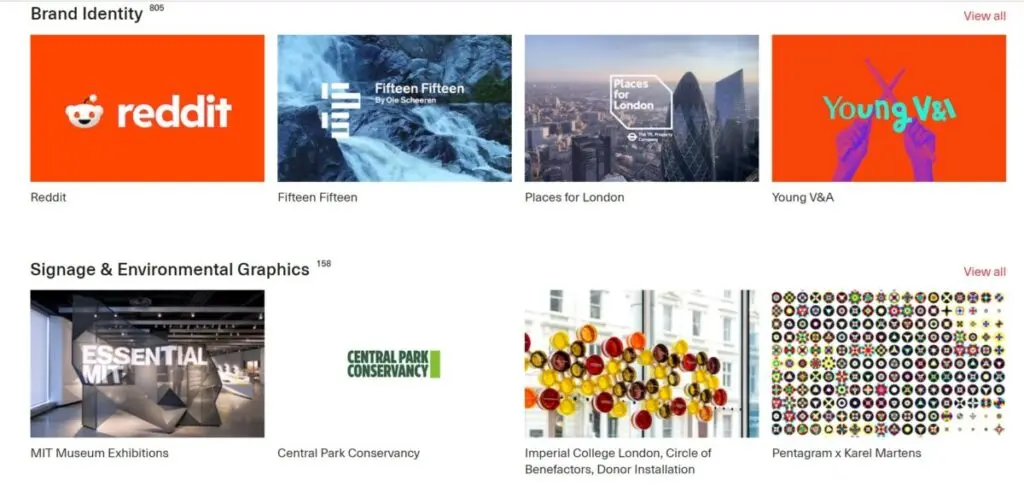
Source: pentagram.com
-
Website Graphic Design Services
Unlike web designers, website graphic designers focus on optimizing your online content for an engaging user experience. They ensure visual consistency across your site, blending images and copy seamlessly.
Website graphic designers are experts dedicated to crafting visually attractive and user-friendly websites. They leverage their proficiency in graphic design software like Adobe Photoshop, Illustrator, and Figma and a deep understanding of web technologies such as HTML, CSS, and JavaScript. This combination allows them to create websites with appealing aesthetics while delivering practical functionality.
These professionals play a crucial role in ensuring your online presence looks impressive and provides a seamless and engaging user experience. The services provided by website graphic designers include:
- Website Design and Development
- Landing Page Design
- Website Branding
- UI/UX Design
- Visual Content Creation
- Website Maintenance and Updates
- SEO Design
- Accessibility Design
An excellent example of a skilled website graphic designer is Alex Coven—an expert proficient in Graphic Design, Web Development, and Lettering. Coven's approach is straightforward and effective, as seen on his website and work portfolio. Notably, Coven employs a simple yet impactful design strategy by overlaying each project with a distinct color, enhancing user-friendliness and visual impact on the website.
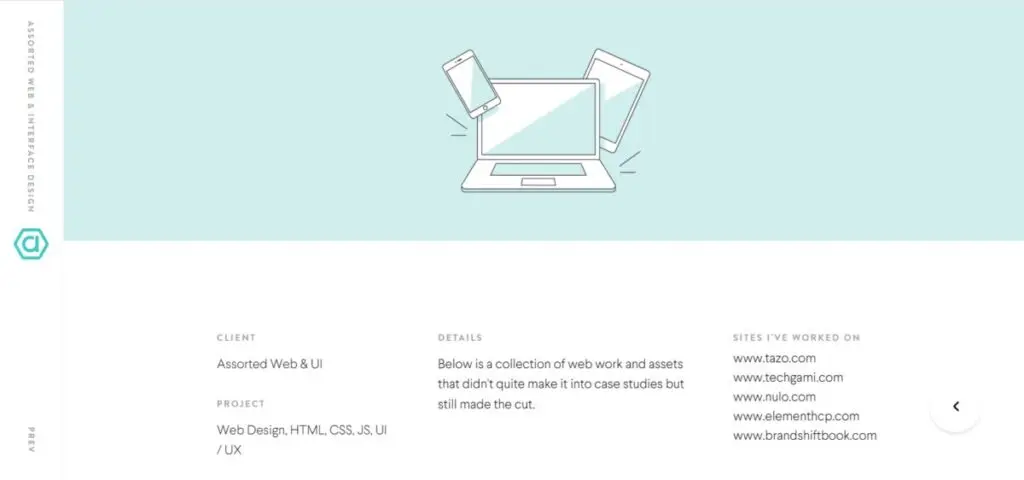
Source: alexcoven.com
-
Graphic Design and Printing Services
Print remains relevant, with businesses using hard copy materials like billboards, magazine ads, business cards, and headed paper. Graphic design printing services ensure your paper communications are effective and purposeful.
Unlike fleeting digital messages, printed materials provide a tangible experience that lingers in the audience's memory. Items like brochures and business cards are physically held onto, enabling individuals to revisit information and engage with the brand at their own pace. This tangible aspect fosters trust and legitimacy, strengthening the bond between the brand and the audience.
Businesses now have the opportunity to harness the potential of print for various impactful materials. These include:
- Custom Packaging: Elevate your product presentation with distinctive and visually appealing packaging that mirrors your brand identity.
- Catalogs and Lookbooks: Showcase your products and services in visually pleasing and informative formats, allowing customers to easily browse your offerings.
- Direct Mail Campaigns: Personalized brochures and postcards sent to targeted audiences can drive sales and generate valuable leads.
- Event Signage and Banners: Establish a memorable presence at trade shows, conferences, and events with eye-catching signage.
- Promotional Materials: Flyers, posters, and other promotional items generate excitement and attract new customers.
Did you know that integrating catalogs into your marketing strategy can yield a significant boost in sales—up to 15%? Moreover, 77% of catalog recipients visit the brand's retail store or website.
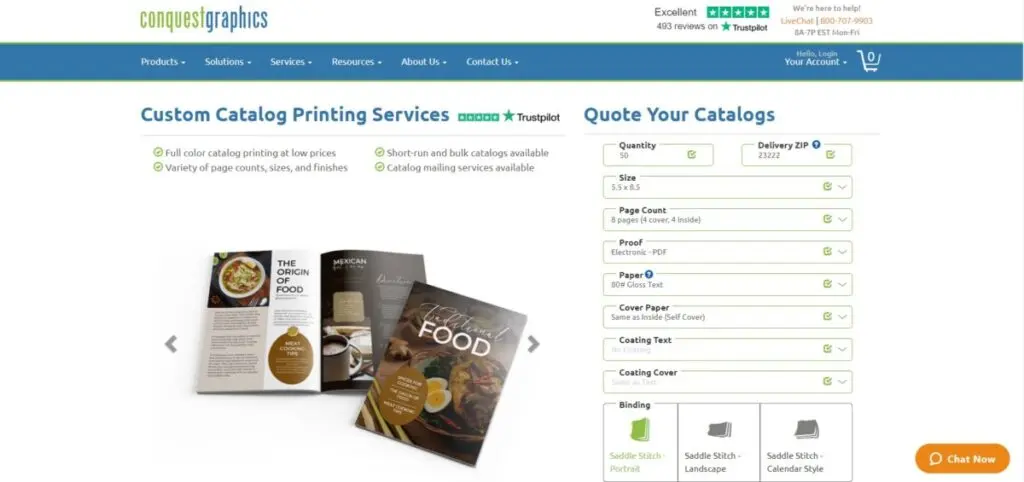
Source: conquestgraphics.com
Understanding these distinct graphic design services allows you to align your choice with your business's requirements and goals. Whether you’re building a brand identity or incorporating cutting-edge elements, selecting the right service ensures your business stands out effectively.
3. Ensure the provider has the right tools.
Make sure the graphic designer you select utilizes top-notch equipment. Using the right tools is crucial as they significantly influence the quality and efficiency of the work. High-end equipment and industry-standard software are indispensable for producing professional results aligned with your expectations.
Hardware:
- High-Performance Computer: Graphic design software requires substantial processing power and RAM. Modern computers ensure smooth performance, especially with large files and complex projects.
- High-Resolution Display: A sizable, high-resolution display offers ample workspace for precise design and accurate color representation.
- Color-Calibrated Monitor: Graphic design relies on color accuracy. A professionally calibrated monitor guarantees accurate color reproduction across various devices and outputs.
Software:
The Adobe Creative Suite is an industry standard and comprises essential graphic design tools:
- Adobe Photoshop: For image editing, photo manipulation, and raster graphics.
- Adobe Illustrator: For creating vector graphics, illustrations, and logos.
- Adobe InDesign: For page layout, print design, and multi-page documents.
- Adobe After Effects: For motion graphics and visual effects.
Depending on the project, additional tools may be necessary, such as:
- Adobe Premiere Pro (video editing)
- Adobe Audition (audio editing)
- Adobe XD (prototyping)
- Sketch (interface design)
These tools are standard in the professional design world. They can ensure the creation of high-quality images for your needs.
The Difference Between a Graphic Design and a Creative Agency
The terms graphic design and creative are often used interchangeably, but it's important to note that not all agencies have the same skill set. Exploring the intersections and distinctions between graphic design and creative design is essential in this context.
What is Graphic Design?
Graphic design is a diverse field focused on creating visual content to communicate ideas to audiences in creative and compelling ways effectively. The purposes of graphic design vary depending on the type of work. For instance, advertisement designs aim to convert customers, while magazine cover designs aim to attract attention to a store.
Graphic design is prevalent in various mediums, including digital advertisements, posters, and infographics. Some designers specialize in specific areas, while others work across different mediums. Typical forms of graphic design include:
- Logo Design: This creates logos and branding materials that differentiate organizations and strengthen their relationships with their audiences.
- Web Design: Graphic designers aim to make digital spaces visually appealing, but their work differs from UX and UI design, which involves more complex aspects of website building and functionality.
- Advertisement and Marketing: Graphic designers work with marketing professionals to create designs for promotional content, which is used to sell products or services and build brand identity.
- Print Design: This graphic design involves visually appealing layouts for physical materials like magazines, books, and brochures. It requires expertise in design hierarchy and page layout to bring the printed materials to life.
What is a Creative Agency?
A creative agency covers graphic design but also extends to motion graphics, typography, audio, social media, and video practices. Primarily, it focuses on storytelling, leveraging digital technology to communicate narratives and ideas effectively in digital spaces.
The digital world accommodates diverse creative content, including graphic design, video, and audio. Creative agencies gain insights into creatively engaging audiences through various digital forms. This field is instrumental in positioning, marketing, and selling products or services. It serves branding purposes and effectively communicates ideas through digital formats and platforms.
A creative agency is suitable if you need assistance with creative thinking, branding, or marketing and advertising campaigns. Here are some standard services provided by these agencies:
- Advertising Services: Businesses often lack the expertise and resources for effective advertising campaigns. Creative agencies step in by conducting market research to identify the target demographic. The agency team then executes the campaign, utilizing either external production companies or an in-house team.
- Consulting Services: Full-service creative agencies assist businesses in various ways, such as brainstorming new products, identifying opportunities to reduce expenses, and discovering new markets and demographics to target.
- Design Services: Creative agencies are crucial when a business wants to revamp its image. They help companies determine necessary brand changes, from designing a new logo to creating updated promotional materials.
- Digital Services: Some creative agencies extend their offerings to include tech-related assistance. While these agencies often specialize in marketing services, they may also provide services tailored to clients’ needs.
Viral Nation, for example, is a globally-recognized creative agency. Their award-winning team of designers, storytellers, social experts, and strategists crafts compelling content, fostering cultural relevance across various platforms. Viral Nation extends its expertise to influencers, content creators, and professional athletes with customized services. These services include partnership opportunities, brand deals, content distribution, events, and merchandising.
What Are the Key Differences Between Graphic Design and Creative Agency?
Graphic design centers on visual communication and creating specific design elements. On the other hand, creative agencies offer a comprehensive range of services, including strategy, marketing, and content creation. Here are four critical differences between the two:
Scope of Services:
- Graphic Design: Primarily focuses on visual elements like logos, brochures, and website visuals.
- Creative Agency: Offers a broader spectrum, including branding strategy, marketing campaigns, content creation, and web development.
Team Composition:
- Graphic Design: Involves smaller teams of specialized designers in areas like illustration or user interface design.
- Creative Agency: Employs larger teams with diverse roles, such as copywriters, strategists, project managers, and specialists in various disciplines.
Client Relationship:
- Graphic Design: Emphasizes technical aspects, collaborating directly with clients on specific projects.
- Creative Agency: Takes a strategic approach, working closely with clients to understand overall business goals and develop comprehensive solutions.
Cost Structure:
- Graphic Design: Fees based on specific projects and designer experience.
- Creative Agency: Charges often follow a retainer model or project-specific fees, reflecting the broader scope of services and team involvement.
Both graphic design and creative agencies offer opportunities for businesses to tell stories, although in different ways. To determine which suits your brand, consider the type of work and stories your business needs. Once you have a clear vision of the creative work to satisfy your business objectives, you can confidently choose the right agency to work with.
Importance of Graphic Design in Modern Business
In today's digital era, where attention spans are brief and visuals are paramount, graphic design is indispensable. It plays a pivotal role in shaping brand perception, effectively conveying information, and ultimately driving success. Here are key reasons why graphic design holds such importance in the contemporary business landscape:
1. Establish Brand Identity
Establishing a solid and recognizable brand is crucial in a competitive market. Graphic design plays a significant role by creating consistency across various platforms and reinforcing brand identity through elements like color schemes, typography, and logos.
Take Coca-Cola as an example. Its iconic red color and unique typography logo are recognized worldwide. Even in non-English-speaking regions, the brand is instantly identifiable by its colors and logo design.
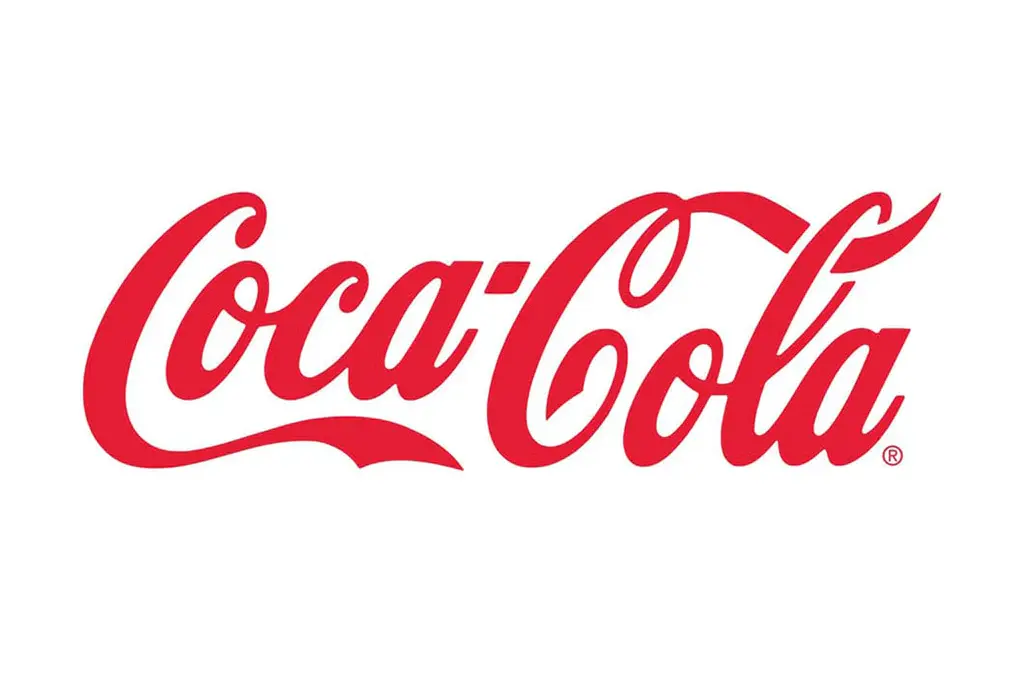
Source: kreafolk.com
This example highlights how graphic design fosters a unique and memorable brand identity, helping businesses stand out. It goes beyond creating a logo or choosing colors; it involves crafting a visual language that communicates the brand's essence to the audience. This visual language, consistently applied across all platforms, reinforces brand identity and builds trust with the audience.
2. Shape Brand Persona
Graphic design goes beyond a logo; it shapes a brand's visual identity, covering logo design, typography, and overall aesthetics. It influences the emotions and associations a brand evokes, creating a compelling identity that resonates with the target audience and distinguishes it from competitors.
Let's delve deeper into this benefit:
-
Logo Design
Graphic design, particularly logo design, is the initial point of contact between a brand and its audience. A well-designed logo visually represents the brand's values and personality, leaving a lasting impression. For example, the FedEx logo cleverly incorporates an arrow, symbolizing speed and precision.
-
Typography
The choice of typography in graphic design contributes significantly to a brand's personality. Different fonts evoke distinct emotions, and consistent typography across brand materials reinforces a cohesive identity. Luxury brands like Chanel and Louis Vuitton communicate elegance and sophistication with their distinctive typography.
-
Color Palette and Aesthetics
Graphic design is crucial in selecting a brand's color palette and overall aesthetics. Colors evoke emotions and influence brand perception. Consistency in color usage fosters recognition and shapes the brand's visual personality. Starbucks, with the rich green color and earthy tones used throughout its logo’s history, creates a warm and eco-friendly brand persona.
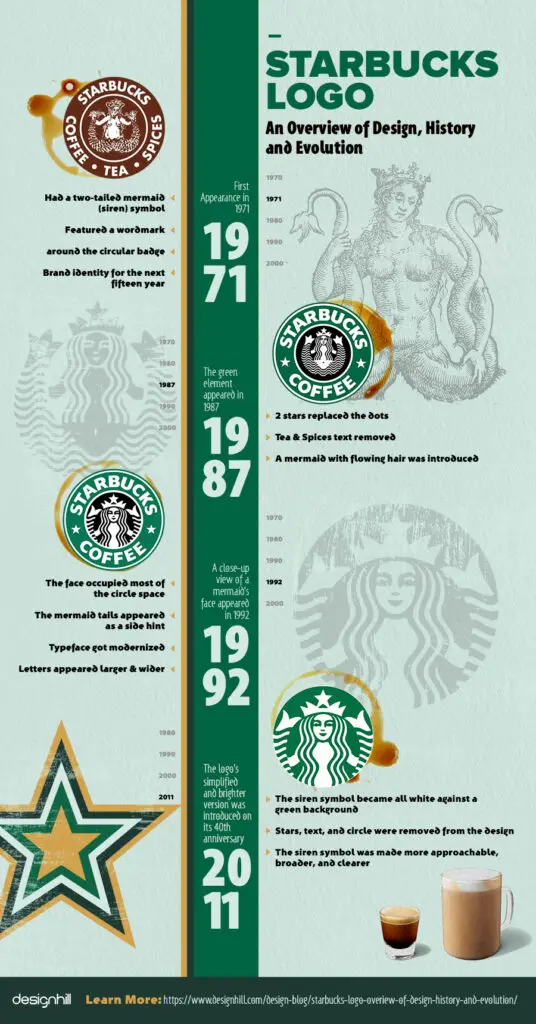
Source: designhill.com
-
Visual Consistency Across Platforms
Graphic design ensures consistent visual identity across platforms, from websites to social media and print materials. This consistency strengthens the brand's persona, making it instantly recognizable. For example, Google's clean and vibrant design across its products reflects innovation and user-friendliness.
Graphic design can also go beyond visuals to create a brand persona, giving a face to the abstract characteristics, values, and voice that businesses cultivate. For instance, LEGO doesn't just sell colorful bricks; it encourages customers to have fun and be creative, bringing imagination to life.
These examples demonstrate how graphic design effectively shapes a brand's persona and creates a compelling identity that resonates with the target audience, setting them apart from competitors.
3. Convey Information Clearly
Graphic design enables the effective and concise communication of information through visually engaging infographics, brochures, and marketing collateral. Well-designed graphics enhance comprehension, grab attention, and leave a lasting impact.
Well-designed graphics enhance comprehension, capture attention, and leave a lasting impact. These examples of graphic designs communicate their messages effectively:
-
Infographics for Visual Storytelling
Graphic design plays a crucial role in creating visually engaging infographics that distill complex information into easily digestible visuals. Infographics, combining icons, charts, and text, tell a story and simplify data. Using infographics on a website can boost website traffic by as much as 12%. For instance, the World Health Organization (WHO) uses infographics to make health-related information accessible to a broad audience.
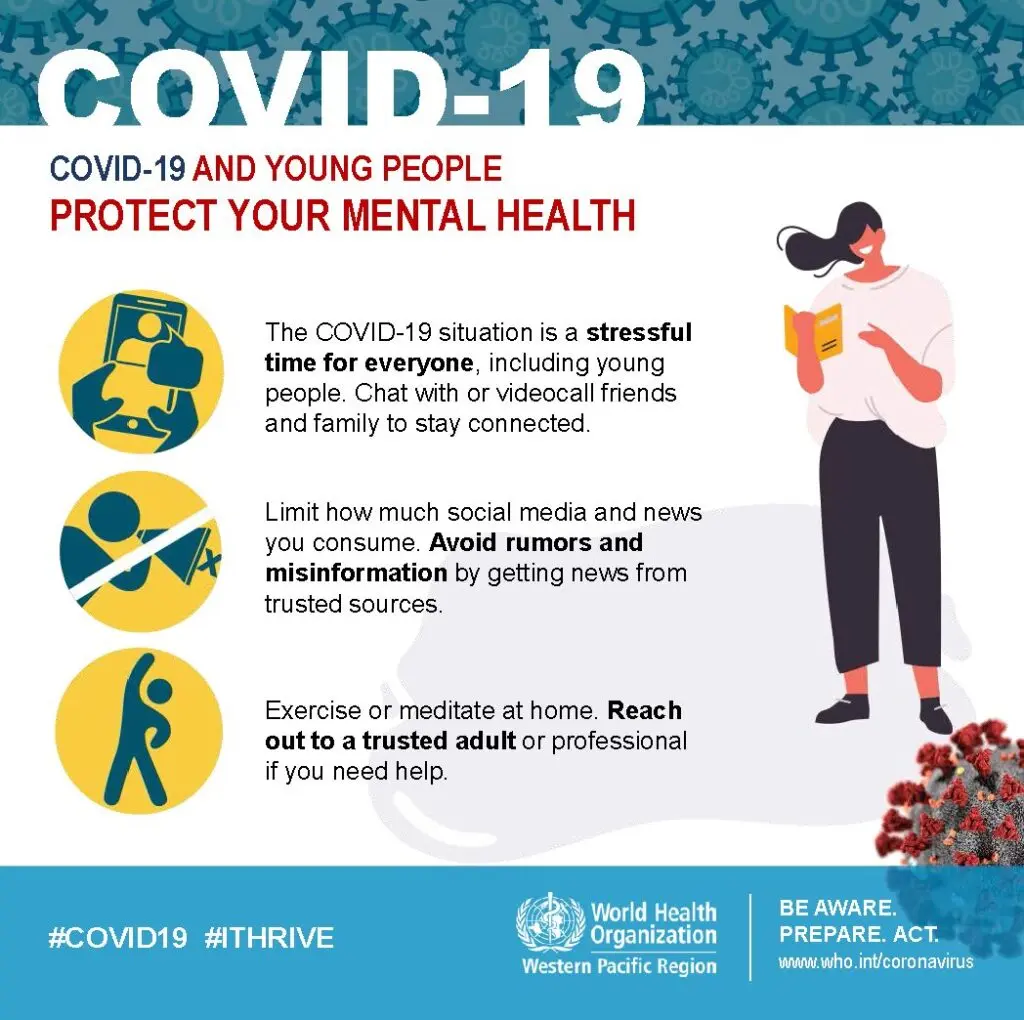
Source: who.int
-
Brochures and Marketing Collateral
Well-designed brochures and marketing collateral effectively communicate key messages about a product, service, or brand. Graphic design organizes information visually, guiding the audience through content and highlighting key selling points. Apple's product brochures, in particular, are known for minimalist design, combining high-quality visuals with concise text.
-
Attention-Grabbing Designs
Visually striking designs in a crowded digital landscape will more likely capture the audience's attention. Graphic design principles like color psychology and typography create eye-catching visuals with specific purposes.
Yellow-and-black branding is a popular choice for attention-grabbing design. Yellow, a vibrant and attention-catching color, can evoke joy and warmth. In contrast, black is often associated with sophistication, power, elegance, and authority. Examples of this attention-grabbing color psychology design include Best Buy, National Geographic, Stanley, Caterpillar, and Post-it Brand. Red, on the other hand, is often incorporated in fast food branding because of its ability to stimulate appetite. Examples of this can be seen in KFC, McDonald’s, Wendy’s, and Burger King.
4. Present a Polished Image
Consistent use of logos, images, and visuals across channels builds an impressionable brand with heightened awareness. Expertly composed high-quality graphics reinforce brand recognition and professionalism. Take Nike as an example. With its simplicity and fluidity, the globally recognized "swoosh" logo conveys motion and speed, aligning with Nike's mission to bring inspiration and innovation to every athlete.
5. Boost Revenue Generation
Visually appealing websites have the ability to captivate visitors, encourage exploration, and lead to increased conversions. The global graphic design market is valued at $45 billion, having experienced a 3.8% growth in 2023. The industry's revenue has steadily increased at a CAGR of 2.8% over the past five years, reaching $16.6 billion.
A user-friendly and visually appealing website or app motivates visitors to linger, explore products or services, and ultimately convert into customers. Clear and enticing call-to-action buttons, strategically integrated into the design, help guide users toward purchasing. For instance, Amazon's website successfully drives online sales because of its user-friendly layout, straightforward navigation, high-quality product images, and prominent call-to-action buttons.
6. Cultivate Trustworthiness
Well-executed graphic design instills trust and credibility in the target audience. Professionally designed visuals convey professionalism, attention to detail, and reliability. Investing in high-quality graphic design reflects a commitment to delivering exceptional products or services, building a positive brand perception and long-term customer trust.
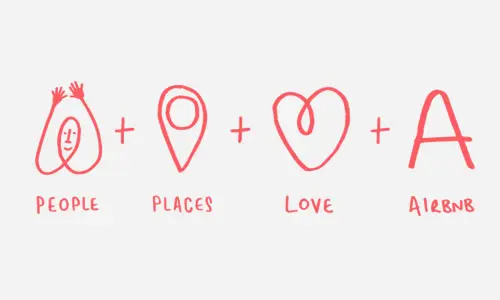
Source: logodesignlove.com
Take Airbnb, for instance. Their logo, the "Bélo," cleverly combines four essential elements: a head for people, a location icon for a place, a heart for love, and an 'A' for Airbnb. This symbol, universally recognizable like the brand's name, solidifies a robust brand identity and conveys trustworthiness by articulating the brand's mission of creating a world where everyone can belong anywhere.
An Overview of the Types of Graphic Design Services
Graphic design is a vast field that covers various specialized services, all geared towards effective visual communication. Here's an overview of the most common types:
1. Branding and Identity Design
This creates a visual identity for companies or products, involving logo design, typography, color schemes, and image libraries that embody a brand's personality. It helps businesses establish their visual identity as part of branding initiatives, conveying their essence and engaging customers.
A strong brand identity includes crucial elements like:
- Logo
- Color Palette
- Fonts
- Imagery Style
- Patterns
- Shapes
- Brand Guidelines
Graphic designers, who often specialize in specific design types, play a vital role in shaping brand identities. Those focusing on brand identity design must stay abreast of graphic design trends, understanding what designs resonate with customers to ensure the effectiveness of the visual representation of your brand.
Graphic designers collaborate closely with business owners or marketing teams to craft diverse web and print media graphics. The core services in this type of graphic design include:
- Logo Design
- Brand Guidelines
- Brand Messaging
- Visual Style Development
- Brand Positioning
- Stationery Design
RNO1, a San Francisco-based branding agency, provides these services and more. RNO1 collaborated with Ourglass, an innovative lifestyle platform integrating social media and entertainment via blockchain technology. They focused on a Web3-oriented experience design, enabling users to interact with impactful content that enhances their daily lives.
In the initial phase, RNO1 developed a brand architecture, visual identity, and design system (including iconography and varied patterns). These elements were crafted to seamlessly convey Ourglass’ ethos to a global audience, offering an interactive experience.
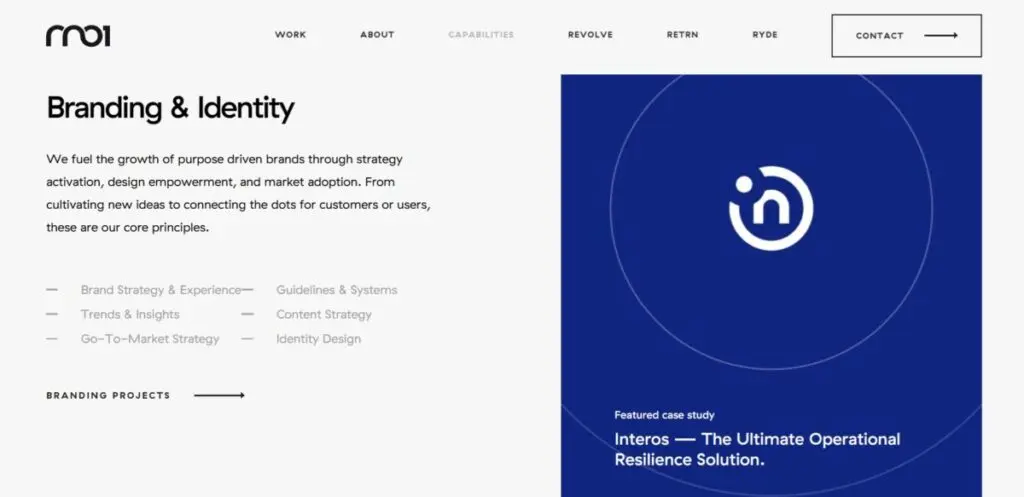
Source: rno1.com
2. Print Design
Print design involves crafting materials like brochures, business cards, and billboards, demanding a keen eye for detail and an understanding of print processes. Designers may specialize in specific media or create diverse collateral for print, digital, and more. Although traditionally print-centric, this design type extends to digital assets, particularly in content marketing and digital advertising.
Examples of print materials include:
- Postcards, flyers
- Magazine and newspaper ads
- Posters, banners, billboards
- Infographics
- Brochures
- Vehicle wraps
- Signage, trade show displays
- Menus
This charming brochure below is a delightful showcase of visual appeal. It blends illustrated icons with photos to create a lively and engaging marketing piece.
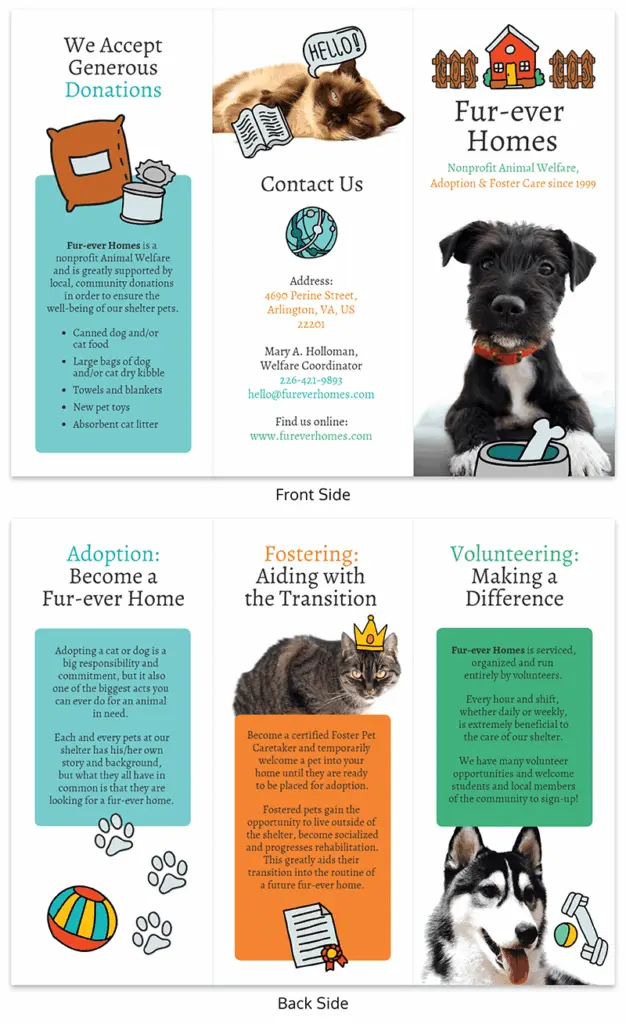
Source: venngage.com
3. Digital and Web Design
Digital and web design involve crafting visual elements for online platforms, websites, and digital interfaces. This includes tasks like page layout, image selection, and website typography. Web design is closely linked with UI and UX design, aiming for an interface that balances visual appeal with optimal usability. The result is a responsive and user-friendly design for websites, mobile app interfaces, and social media graphics.
UI design in graphic design focuses on improving the user’s visual experience by designing on-screen elements such as buttons, menus, and micro-interactions. Examples of user interface graphic design include:
- Web Page Design
- Theme Design (WordPress, Shopify)
- Game Interfaces
- App Design
SmartSites is an excellent example of a digital marketing and web design agency. The company initiates all website projects with a “Website Plan and Strategy” phase.
SmartSites created a custom website design for EnMed Micro-Analytics, an infant-health screening service. The website boasts a sophisticated appearance with crisp, attractive, and informative images. As a result, EnMed MicroAnalytics has experienced increased audience reach since the launch of its customized website.
4. Motion Graphics and Animation
Motion graphics incorporate animation, audio, typography, imagery, video, and other effects in online media, television, and film. The surge in popularity of this medium is attributed to technological advancements and the dominance of video content in recent years.
The role of a motion graphics designer is a relatively new specialization. Historically confined to TV and film, digitalization has democratized the field, making it more accessible and cost-effective. Now, motion graphics pervades all digital platforms, creating diverse opportunities. Examples of motion graphic design applications include:
- Title sequences and end credits
- Advertisements
- Animated logos
- Trailers
- Presentations
- Promotional videos
- Tutorial videos
- Video games
- Banners
- GIFs
Motion graphics designers start with storyboards and then use animation, video, and traditional art to bring their concepts to life. Depending on the industry, marketing, coding, and 3D modeling expertise can be advantageous. Here’s a great example of a logo and animation for Beyond Plastic:

Source: 99designs.ca
5. Packaging Design
Beyond protecting products, packaging is a powerful tool for companies to communicate their brand’s personality and story directly to consumers. Strategically employing color, shape, and typography in packaging design is an opportunity for companies to strongly connect with their audience. Every box, bottle, bag, can, or container provides a chance to convey a brand’s narrative.
Packaging designers play a vital role in this process. They conceive ideas, create mockups, and generate print-ready files. This demands expertise in print processes and a deep understanding of industrial design and manufacturing. Given the multidisciplinary nature of packaging design, designers often find themselves involved in creating additional assets like photography, illustrations, and visual identity.
Capturing attention with packaging is essential, whether through minimalistic designs or creative approaches. Check this toilet paper roll packaging—its creativity can influence consumers to choose the product due to its distinctiveness and appeal.
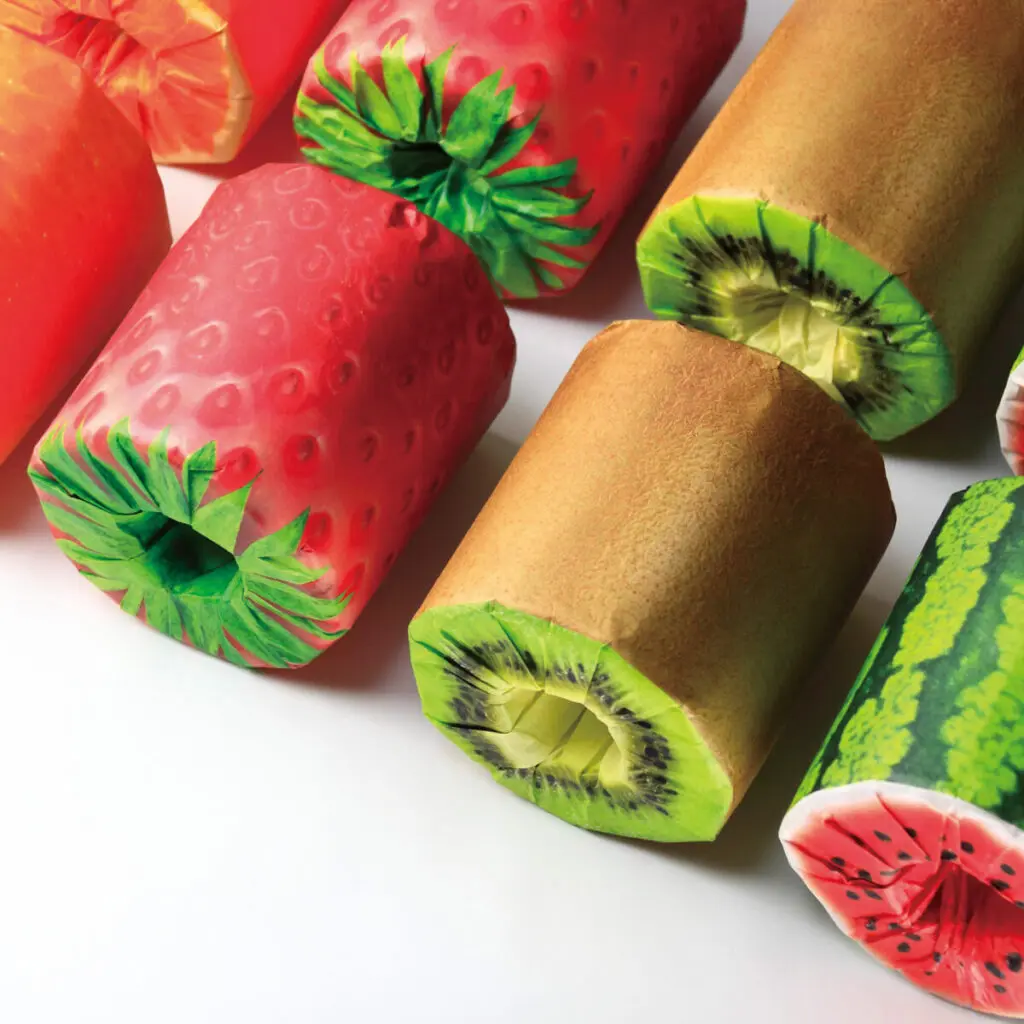
Source: latona-m.com
Packaging designers tackle the challenge of presenting products uniquely to stand out from competitors. The choice between minimalistic or creative designs can impact consumer preference and ultimately influence purchasing decisions.
Price of Graphic Design Services
Graphic design service prices vary based on factors such as the type of service, designer experience, location, and project scope. Here are popular outsourcing options with their typical prices:
Freelancer:
- Experienced designers: $65-$150 per hour
- Entry-level designers: $25-$50 per hour
Design Agency:
- Junior designers: $50 per hour
- Senior designers: $75-$150 per hour
Agencies may charge significantly more for larger projects.
In-House:
- National annual average salary: $56,599
- Higher estimates: $64,500 per year
Standard graphic design project pricing ranges include:
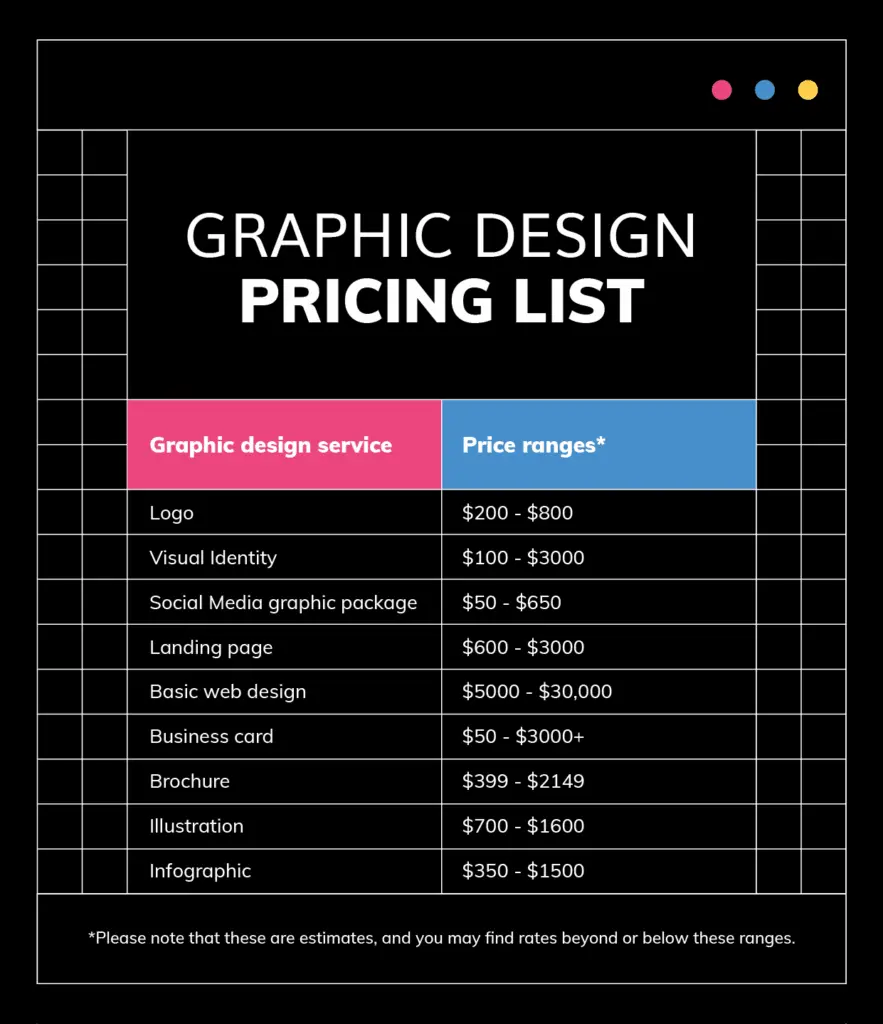
Source: manypixels.co
Subscription-based
Consider subscription-based design services for a flat monthly fee, providing access to a team of designers. A subscription-based design service is most cost-effective for businesses with a clear vision and multiple design needs. Numerous providers like ManyPixels, Design Pickle, and Duck.Design offer flat monthly fees regardless of the number of requests, allowing you to scale plans based on your monthly requirements.
Project-based
Project-based pricing has a flexible approach based on the scope of work, with costs ranging from $100 to $15,000. The process typically involves an initial consultation, where creative briefs are developed and detailed estimates are provided. Freelance graphic designers often favor this billing method. It offers clients clarity on costs upfront and gives designers a stable income base, as they can estimate earnings for each job.
Individual pricing for projects fosters long-term relationships between designers and clients, offering flexibility to freelancers in responding to new requests or urgent needs. This approach allows designers to determine a price for each task without providing an overall quote for a large project that may take days or weeks to complete. The cost of a project-based design depends on several factors, like:
- Project complexity
- Desired turnaround time
- Project size or scale
- Your budget
- Revisions you want during development
- Need for extra services like copywriting or printing
- Any assets you provide (if you have any)
Branding rates
For comprehensive branding design campaigns, costs can range from $11,000 to $70,000. This covers services that include:
- Brand identity
- Market research
- Logo
- Visual
- Editorial style guide
- Brand books
- Web design and development
The cost of branding services may seem a bit pricey. However, these steps are strategic, relatively permanent, and usually involve several rounds of revisions to ensure they align perfectly with your goals and brand personality over the long term. Investing in a professional graphic designer ensures high-quality visuals, adherence to industry standards, and impactful branding materials.
Challenges and Future Trends in Graphic Design
Graphic designers are in high demand nowadays, given the essential role of graphics in modern business. However, even seasoned professionals encounter challenges inherent in the creative process.
1. Creative Burnout
One common challenge faced by graphic designers is creative burnout. It’s a struggle that might puzzle demanding clients. It’s normal for designers sometimes to feel a lull in ideas, resulting in uninspired graphics.
Overcoming the Challenge:
To tackle creative burnout, seek alternative creative outlets. Exploring different forms of expression, like painting, photography, or sculpture, can rejuvenate ideas and offer a fresh perspective. Connecting with fellow designers is another solution. Engaging with colleagues allows you to ask informed questions, potentially leading to new directions or perspectives you hadn’t considered. Explore portfolio platforms like Dribbble and Behance for a daily dose of creative inspiration.
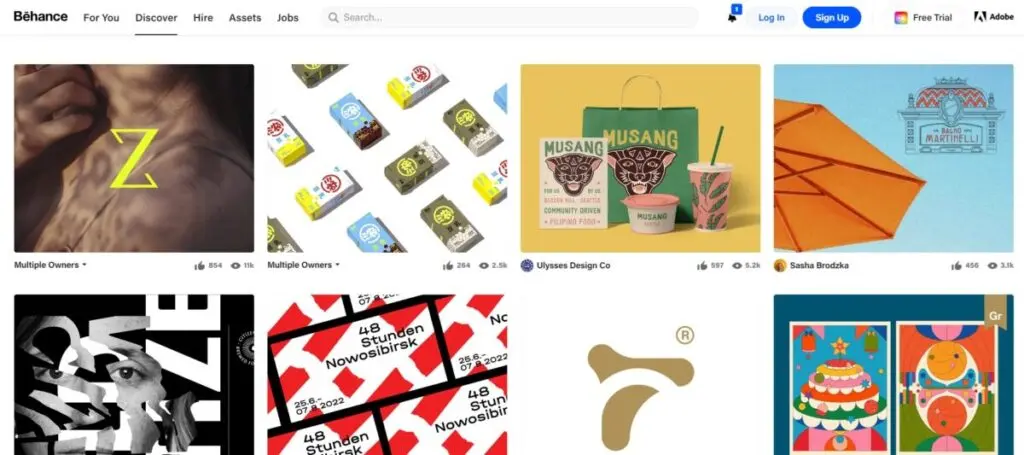
Source: behance.net
2. Balancing Act
In graphic design, a perpetual debate lingers: what holds more weight, aesthetics or functionality? The answer isn’t one-size-fits-all. In UX design, functionality takes the crown, while other areas often dance on the fine line between polished looks and practicality.
Overcoming the Challenge:
Here’s a straightforward guideline—prioritize usability over aesthetics. This might sound counterintuitive from a graphic design perspective, but the essence lies in the purpose graphic design serves. Unlike art, graphic design always has a specific goal.
Think about this: an ad failing to attract clicks or a website leaving users perplexed won’t find salvation in groundbreaking aesthetics alone. Not every brand boasts the most visually stunning identity. Still, consistency becomes the key to fostering customer loyalty and enhancing brand recognition if crafted with a specific audience. Balancing the visual appeal with practical functionality is an art in itself.
3. Keeping Up with Trends
Today, the landscape of graphic design is inundated with a constant stream of advancements in terms of technology and programs, expanding the horizons of modern design possibilities. Enter the AI era in graphic design, where logos and social media posts are crafted with technology. It’s often seen as a cost-effective alternative to professional graphic design.
Overcoming the Challenge:
This challenge is more complex than other obstacles designers face. It’s not merely about navigating the myriad design programs and their daily updates. In the age of AI-generated design, many designers grapple with proving their ongoing relevance. To rise above AI, consider these tips:
- Master a few design programs relevant to your specialization instead of attempting to conquer every program.
- Stay informed by subscribing to design industry blogs, reading relevant publications, and connecting with fellow designers. This will help you articulate why your expertise or chosen design program aligns better with clients’ needs than other options.
- Leverage AI as a complement to your craft rather than a threat. Use it to speed up custom design ideation or get inspiration.
Alongside the challenges, let’s peek into the crystal ball of graphic design to spot the upcoming trends. These include:
1. 3D Surrealism
The surge of AI technology introduces a graphic design trend leaning into 3D surrealism. Imagine surreal settings and products taking on an inflatable, 3D appearance straight out of a Cyberpunk world. Perfect for ads, posters, social media, and web design, Reddit’s 2024 rebrand spearheads this trend with its 3D mascot and logo symbol.
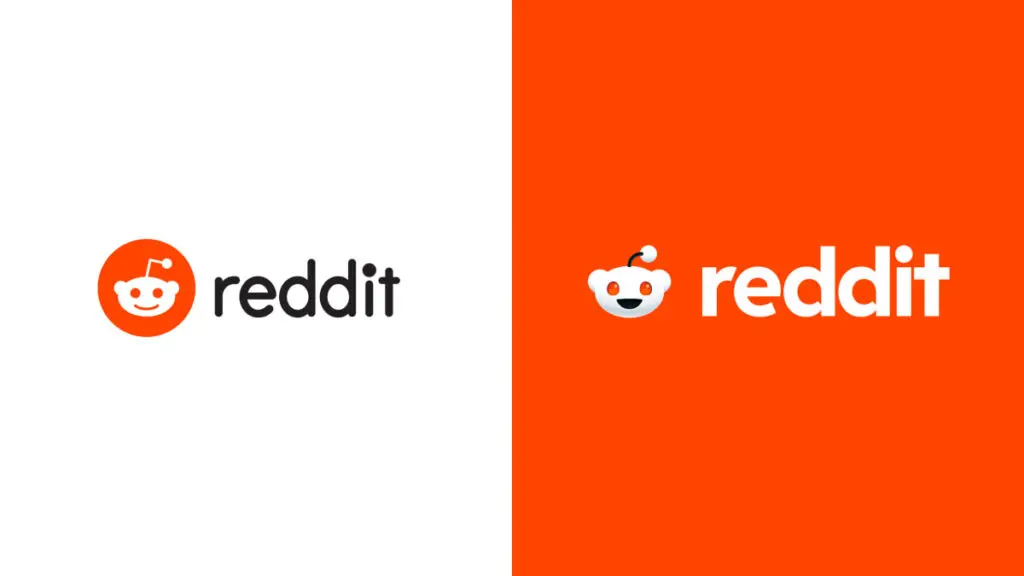
Source: fastcompany.com
2. Maximalism
Prepare for the shrinking of margins as designers embrace maximalism. Every nook and cranny becomes a canvas for an explosion of color, shapes, fonts, and visuals. Picture big, bold fonts in daring sizes and shapes with gradient color combos stretching beyond design boundaries. It’s a rebellion against conventional page sizes, injecting interest and intrigue.
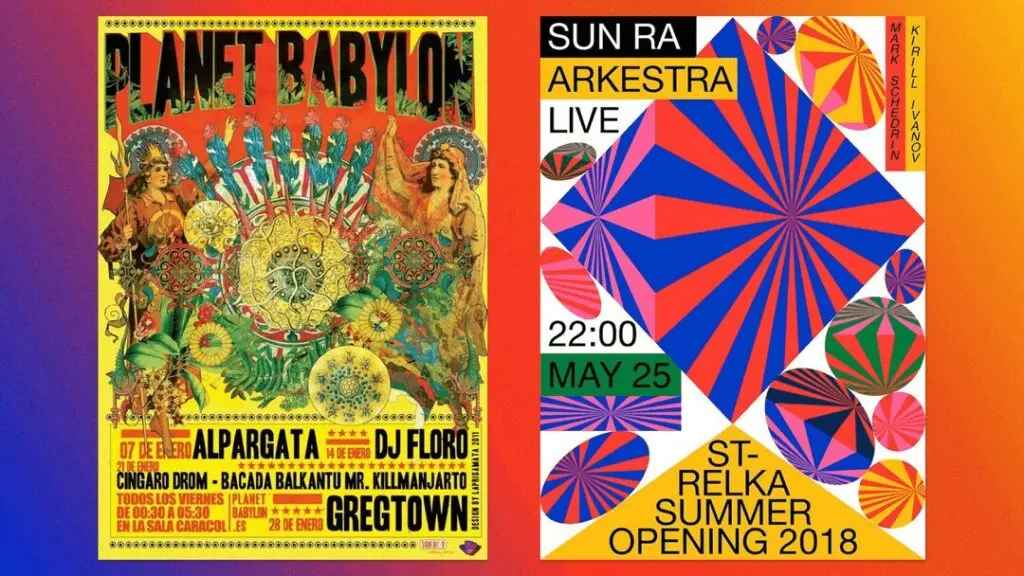
Source: vividcreative.studio
3. Illustration and Animation
2024 marked the fusion of illustrations and animation, giving rise to the popularity of the logo mascot. Hand-drawn logo symbols wield their unwavering power, especially in the food and beverage industry and tech companies. Handmade illustrations and doodles also take center stage, creating a trend focused on reconnecting with people and infusing a sense of fun and emotional connection.
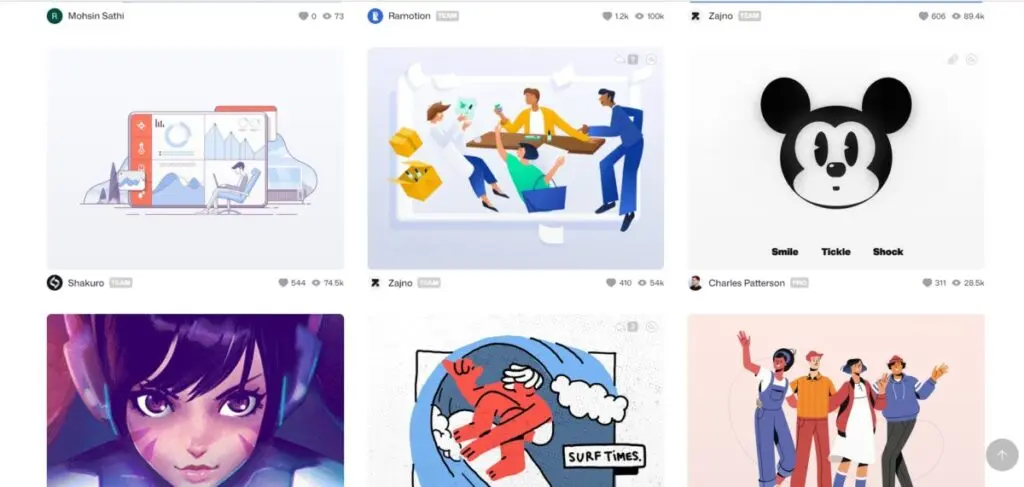
Source: dribbble.com
Final Thoughts
Graphic design is vital for many companies, but exceptional graphic design agencies stand out by elevating it to the next level. In the highly competitive graphic design industry, partnering with a reputable agency can work wonders for your business. Consider your graphic design needs as a valuable investment. Find the right type of service and team up with an excellent service provider to ensure your designs are seamless, attention-grabbing, intuitive, and compelling.
Frequently Asked Questions
What is the most popular graphic design company?
Sagmeister & Walsh is one of the most popular graphic design companies. Founded by Jessica Walsh and Stefan Sagmeister, this New York-based company is renowned for its conceptual works and exhibitions, serving clients and the art world.
Which type of graphic design is the most in demand?
Identifying the most in-demand graphic design can be difficult due to the constantly changing industry trends, needs, and location. However, according to recent industry reports, certain specializations consistently experience high demand. These include:
- UX/UI Design
- Motion Graphics and Animation
- Branding and Identity Design
- Packaging Design
- Content Design and Illustration

